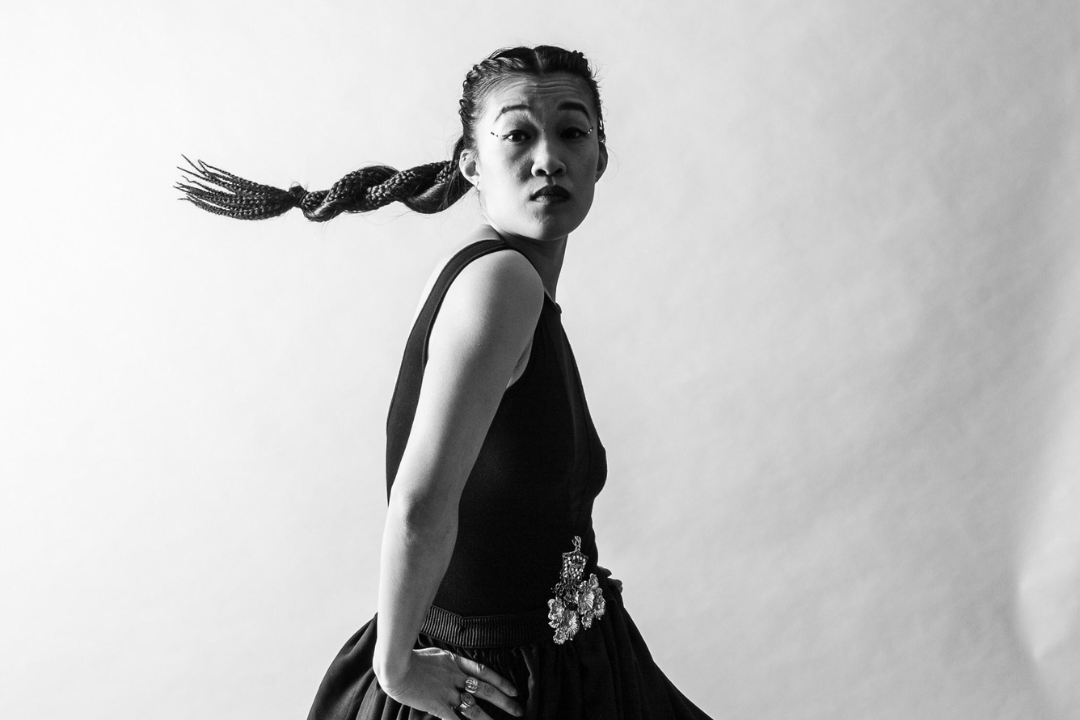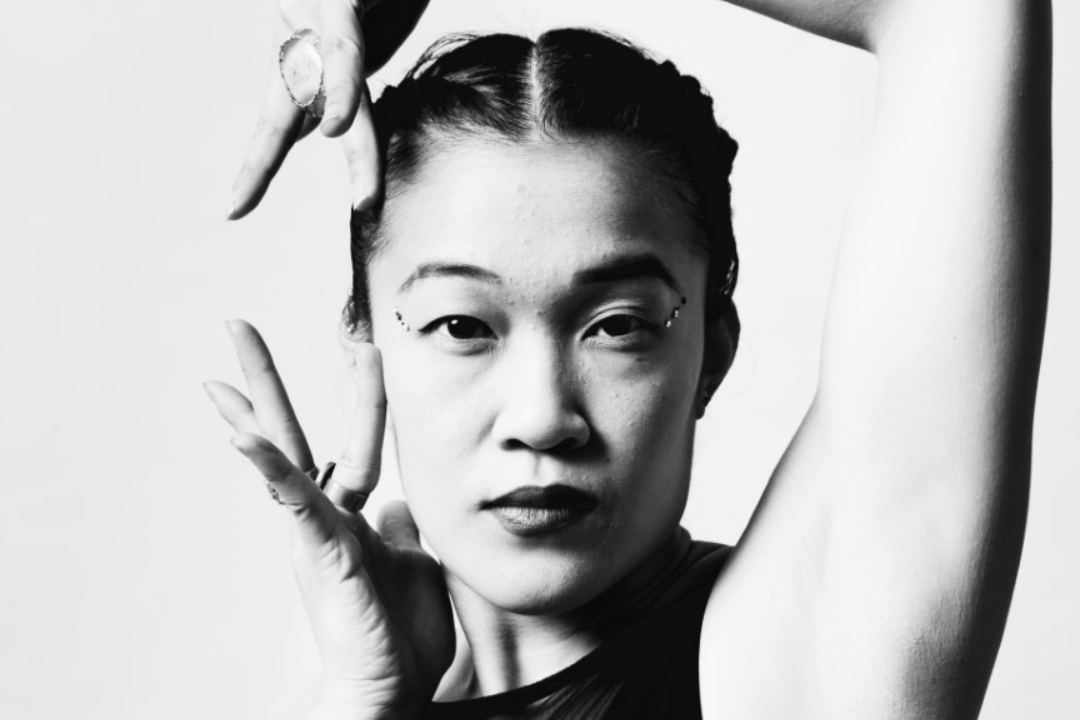Being a freelance artist is hard, especially in the face of doubt from others. So how can artists demonstrate resilience in a creative industry which, for all its joy and purpose, can also be brutal and exhausting at the same time?
Julia Cheng, a creative director, dance artist and Olivier-nominated choreographer for Cabaret, writes for Dance Umbrella about the power of non-conformity, actively straying out of your comfort zone and refusing to compromise on your aspirations.

Julia Cheng, credit Dan Jose
I write a lot for myself and I keep all these writings. When looking through my self-musings in preparation for this article, I posed to myself two questions.
What is true to me right now?
How have I got here?
I found the answers in this extract, from January 2019:
I remember a casting agent said to me I look better in real life than in my pictures.
When a director said to me: “You know what the trouble with you is, we can’t define what you do.”
Today a master said to me: “Maybe you should go back to college and study something like numbers.”
A loving relative who said: “Hey, maybe it’s time you get a sensible job now.”
Once a trusted lover told me to get some work.
Times when an elder would say: “Hey, you’ve actually achieved some successes now, so you can let go of it and do something else more stable.”
I remembered more my aspirations, passions and true expressions.
What is true to me right now?
It’s bloody hard, this freelance artist lifestyle, and to keep going. Especially in the face of doubt.
How have I got here?
It’s simply by keeping to the last line: “I remembered more my aspirations, passions and true expressions.”
I want to share my thought processes on resilience in the arts and how I have navigated the creative industry across different genres through this labyrinth of a career path.
To use an old-school gaming analogy, think Mario Kart: You can suddenly get hit by a red shell and knocked off course to start again, then get speed catapulted forward on a golden arrow, then grow 100 times bigger, only to then be struck and shrunk by lightning. Mix that with Chun Li in Street Fighter doing her spinning bird kick until you are KO’d. Cue the sound effects: “YOU WIN!” “YOU LOSE!”
So yes, there are plenty of wins and losses, but perhaps we are all winning by actively staying in an industry that can be super brutal and exhausting at the same time as being fulfilling, therapeutic and purposeful.
I’ve just finished working on a short dance film with my company, House of Absolute, for Sadler’s Wells to culminate our two-year residency with Philharmonia Orchestra. At the same time, Cabaret, the musical I choreographed, is still running in the West End, and I’m preparing for an opera next year which is being presented in Europe.
I strive to be fearless and not conform to one single way of being identified. I gain resilience when I throw myself into unfamiliar territory, different worlds, artistic genres and collaborations – aiming to not allow a singular title or project define me.
But in reality, on occasions I am fearful. Imposter syndrome can kick in… until I kick it back out. A wise man told me everyone has imposter syndrome at some point. And it’s true, I remember an interview with my favourite actor Viola Davis who said she had it while walking off stage after winning her Oscar. I take that as a reminder that it’s OK, it can happen to all of us at some point. Maybe it’s a way to keep ourselves on our toes to be the best we can be in order to achieve, or to give nothing less than our utmost excellence.
My journey in becoming a choreographer, creative director and dance artist has been somewhat unconventional and unique. I came from a super working-class upbringing in Luton. I was taught modern dance one-on-one at 23 years old from teacher Stuart Thomas, who saw something in me. I trained in clubs at Hip Hop jams and battles. I travelled around the world to learn different dance styles. I had to choose theatre in university as my dance audition was, let’s say to put it lightly, “not up to par”. All of these unusual challenges have and continue to equip me with a wide range of approaches during creations that can be adaptable and fluid, while also challenging conventions.
Although the unknown is not always my favourite space to be in, it is also where I get challenged, and I can learn more through the growing pains. Sitting in the discomfort of being in new environments that I think I don’t belong in because of the way I speak, or differences in training, process, class, ethnicity, gender etc. Sometimes it is me overthinking this and sometimes actions show me it’s not in my head. We have a long way to go across the creative arts, though still I am hopeful.
During processes of making theatre and performance work, some challenges I have witnessed first-hand are the huge gaps in cultural intelligence in institutions and organisations which have their own separate and sometimes rigid systems in place. Speaking up during difficult moments is uncomfortable, but once voiced it always helps me bridge understanding and compassion within our differences as individual people and our differences in the ways that we work: be it in dance, theatre, film, visual arts, fashion, literature, music. I am not afraid of voicing things that I feel have not been fair, correctly dealt with or managed. Note: communicate, don’t blame. Blame is not my game, I am all for finding solutions together, shifting perspectives and people taking responsibility.

Credit Dan Jose
All this is not to mention the day-to-day ups and downs of the freelance lifestyle, and I am still searching for a way to work in the most optimal headspace. That’s difficult when you can be directing a space and managing large groups of people. And then having production meetings, or meetings for other potential projects, in your lunch break. And then having a mountain of admin to do when you can grasp 10 minutes. And then find training time to maintain our bodies and minds.
Getting a commission is one thing, completing it is another. That process brings an onslaught of meetings either on Zoom, phone calls or in person. The deadlines come in droves: for marketing copy for work you have yet to create, photography and videography, contract negotiation, finding a creative team, booking rehearsal spaces… and don’t get me started on updating websites and social media.
This is all before we’ve even got into the studio to be in a creative space! How can we make the best work like this? Then there’s the post-“completion” work of gathering all footage, photos, evaluations and sometimes report writing when you get Arts Council funding. And again, social media is knocking at the door. We’ve got to inform everyone about what we’ve done, no?
Eek!
It’s no wonder freelancers are maxing out their capacity of 24/7 diary space. I’m a work in progress when it comes to boundary setting for my own time. I also realise how much support and help I need, along with the right people.
Fortunately, I have worked with such an amazing array of artists and teams who have cultural and emotional intelligence bursting through the roof. Their projects always thrive more through heightened freedom, trust and empathy.
At the heart of the challenges that occur in all these different areas of creative work are the different relationships we build. Having the space to communicate with honesty, kindness and transparency is key.
So, in October 2022, I dig deep, I tap into my pockets of fearlessness and drive, I gravitate to new collaborations by following my gut, and I continue to choose projects that are alien to me, knowing this will force me to evolve and thicken the skin each time. Ultimately…
…I remember my aspirations, passions and true expressions.
Edited by James Cheng-Morris
About Julia Cheng +
Julia Cheng founded House of Absolute in 2014, she is a creative director, choreographer and dance artist with an impressive portfolio of works presented nationally and internationally.
Julia is a 2022 Olivier Award nominated choreographer, in recognition of her critically acclaimed choreography on West End’s Cabaret at the Kit Kat Club.
Julia is also a judge and mentor for BBC Young Dancer, mentor for the biggest UK Hip Hop Festival Breakin’ Convention, and patron of Next Generation Youth Theatre in her hometown of Luton.
Julia has worked with Chinese Arts Now, an organisation championing British East Asian artists. Cheng also has co-directed operas, one of which was awarded the George Butterworth Prize 2020 with composer Alex Ho. She has curated cross-art form exhibitions, theatre shows, dance films and youth productions.
Having judged, won and competed in many Hip Hop battles since 2007, her prolific reputation has led to campaigns with Dr Martens, Vogue Italia, Wella, Kowtow New Zealand and BBC World Service Persia.
Her influences draw from her dance training of Hip Hop dance, Waacking, contemporary dance, martial arts, theatre studies and eastern philosophy. She prides herself on combining collaborative approaches to processes and has collaborated with poets like Lavinia Greenlaw, to music artists Shingai and Floacist, composers Simon McCorry and Alex Ho, artist/sculptor Laila Muraywid, curator Kerry-Campbell and theatre director/activist Daniel York-Loh.
Having recently choreographed for a double-bill opera with director Isabelle Kettle for the Royal Opera House, Julia is currently working on House of Absolute Philharmonia Orchestra Artist in Residence 2022 projects, developing her production with Sadler’s Wells 2022 and directing / choreographing ‘anti-opera’ Untold with composer Alex Ho for Europe tour in 2023.
